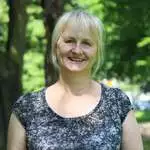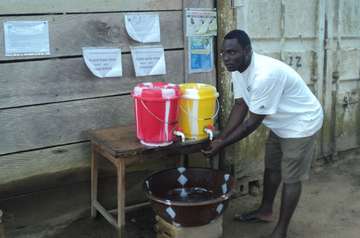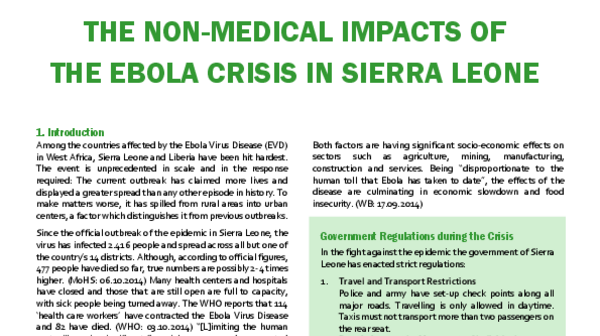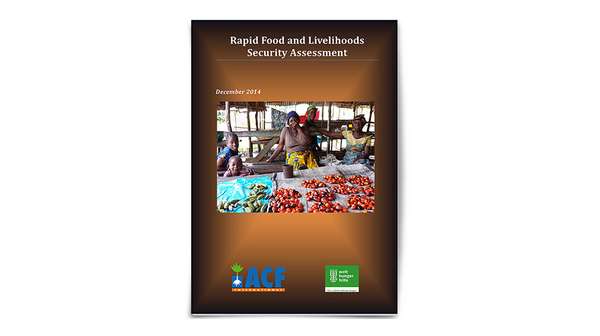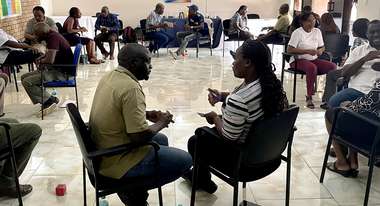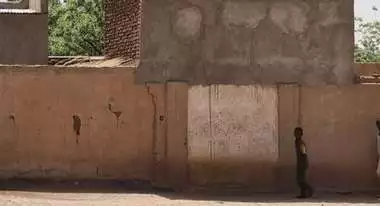Among the countries affected by the Ebola Virus Disease (EVD) in West Africa, Sierra Leone and Liberia have been hit hardest.
Ebola in Sierra Leone and Liberia
The virus had devastating consequences for people in West Africa. We continue our support.
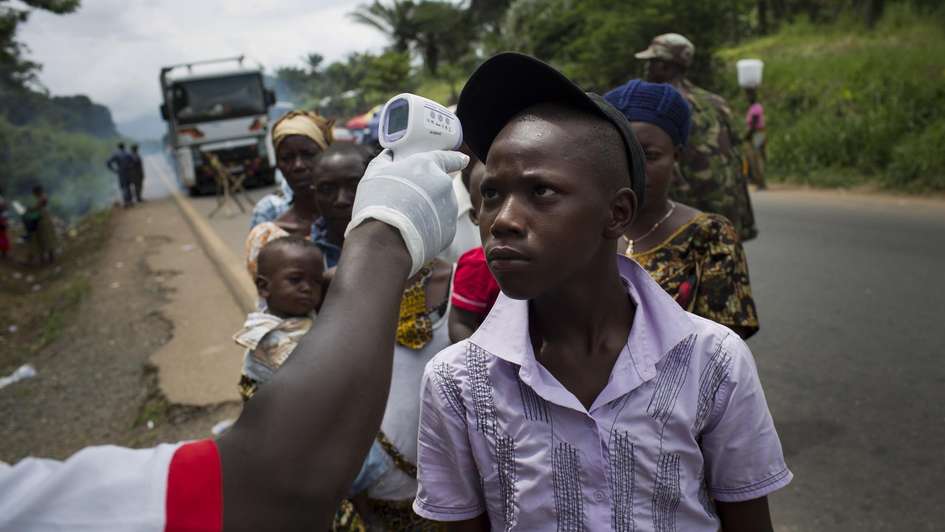
More than 28,500 people in West Africa have been infected with the Ebola virus, more than 11,300 have died since its outbreak in March 2014 (UN). The highly-infectious disease brought devastation to Liberia and Sierra Leone. We have been supporting the people there since the outbreak of the biggest Ebola epidemic in history through prevention and education, food security and social reintegration programmes. The worst of the outbreak seems to be over, but our work is not yet done: We continue to support people on the long road to recovery.
What is Ebola?
Ebola virus disease (EVD) is a severe, often fatal illness. It spreads through human-to-human transmission via direct contact with bodily fluids and with surfaces and materials contaminated with these fluids.
The Ebola crisis is not yet over
Tens of thousands have needed medical care and health provision. The disease also inflicted huge damage on the economies of both countries: seeds and food became scarce, food prices high. Travel restrictions by the governments disrupted the supply of goods and the economy as a whole, especially in rural areas. The prices for basic goods like rice and oil rose up to 40% in Liberia.
The epidemic gradually declined over the course of 2015. However, Sierra Leone reported a new case on 15th January, just one day after the World Health Organization had declared West Africa as Ebola-free. The crisis is not yet over – learn how Welthungerhilfe is supporting people in need.
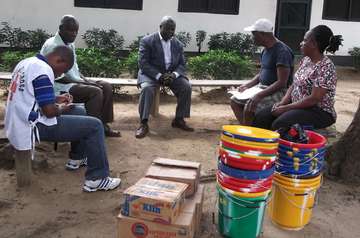
How we have helped in Sierra Leone and Liberia:
Following the Ebola outbreak in 2014, our teams in Liberia and Sierra Leone have been supporting communities through different activities. Some examples are:
1. Schools, education and health:
- We constructed four Ebola Treatment Units in Liberia,
- rebuilt three schools in hard-hit communities in Sierra Leone and Liberia,
- coordinated UNICEF’s back-to-school campaign in the southeast of Liberia to enable 175 schools to re-open and around 127,000 children to continue their education, establishing water and sanitation systems,
- and finally built seed stores with drying floors, community meeting places, toilets for 87 affected communities in the southeast of Sierra Leone
Facts and figures
December 2013: first Ebola cases in Guinea
By March 2014: Liberia, Sierra Leone, Nigeria and Senegal also affected
Over 28,500 people infected, over 11,300 killed
(last updated: January 2016)
14th January 2016: WHO declared West Africa free of Ebola
15th January 2016: new case reported in Sierra Leone
2. Social reintegration of families with Ebola victims or survivors:
- In Bo, Sierra Leone, we set up a Post-Ebola Care Centre with 25 beds, where Ebola survivors can receive tailored physical and psycho-social support. This helped 474 survivors in the region gain access to free healthcare and psycho-social support.
- In the far east of Sierra Leone we initiated and supported an eye screening programme for 204 survivors to identify those with uveitis and organised home visitation of uveitis patients.
- In the northwest of Liberia, together with partners, we provided medication and psychosocial support to 455 survivors and their families
- We trained and financially supported ten theatre groups in the south and east of Sierra Leone who educate communities through drama performances on Ebola
- We organised more than 40 shows with Clowns Without Borders Spain – offering Ebola orphans and former quarantined households some moments of joy and laughter
- Through our partner ACF, 300 Ebola affected families in the Western area saw their income increased by 80% through financial support in farming, hair dressing, tailoring, carpentry, masonry, catering and petty trading
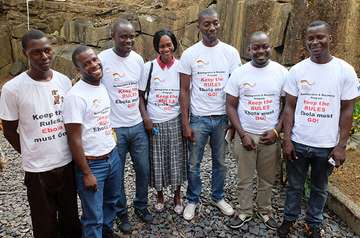
3. Prevention and community involvement
- In Liberia, more than 267,000 people were reached with life-saving messages reducing fear and stigma and encouraging behavioural changes to improve hygiene and sanitation practices.
- In Sierra Leone, over 100 youths were mobilised at checkpoints in the Freetown area to take the temperature of passengers on roads leading to the capital,
- and we supported communities to participate and engage in local small-scale Ebola response activities.
- In Kailahun district, in Sierra Leone, together with our partner SEND we constructed shelters at 21 border crossing point with Liberia to support security personnel have lodging places to work in the night and furnished them with mattresses, solar, PPEs and sanitary materials to enable security personnel function and monitor the people effectively
4. Nutrition and food security
- In Liberia, 630 vulnerable and quarantined families (3,200 people) were supported with food packages,
- 241 households (1,229 people) received basic household items,
- seeds and tools were provided to 600 Ebola-affected families (3,060 people)
- In Sierra Leone, we provided quarantined households and Ebola orphans with food packages – in total 50,000 people benefited.
- In cooperation with the Ministry of Social Welfare, Gender, and Children’s Affairs, we reached over 2,000 Ebola-affected households caring for orphans and over 3,500 survivors with immediate cash.
- Seed banks in 68 agricultural and Ebola-affected communities helped 6,445 farmers to grow enough rice to cover their own needs.
- A total 1,639 households in 75 EVD (Ebola virus disease) affected communities have received seeds and tools of their own choice up to a value of 35 Euro per household.
- A total of 64 communities prioritised their development plan for 2015/16 and were supported with a start capital of up to 2,000 Euro to construct seed stores with drying floors, community meeting places, toilets and in operation of business enterprises.
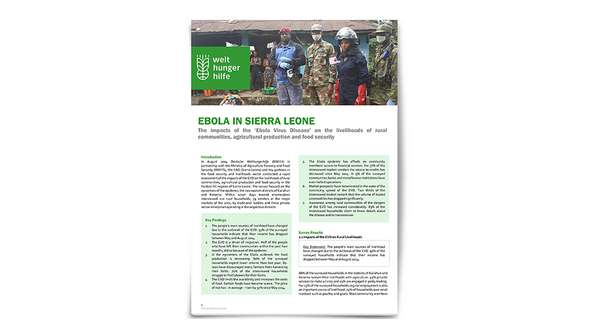
On the road to recovery – our ongoing support in West Africa
The worst of the Ebola outbreak may be over, but the affected countries will still need some time and support to recover. In 2016, our teams are working on post-Ebola programmes, offering support to vulnerable people rebuilding their livelihoods and improving health care facilities in Sierra Leone and Liberia.
Sierra Leone: We continue to support projects that help people recover from the crisis, especially with a focus on community development, capacity building of District Councils and integration of Ebola survivors.
In Liberia, the first epidemic began on 22 March and ended in April, 2014 and mainly affected two counties
Liberia: Support to the Liberian Government in its post-Ebola recovery efforts for the years ahead include two projects.
- Building resilient health environments in four specific regions of Liberia but also Sierra Leone, which were severely affected by Ebola (funded by BMZ, the German Federal Ministry for Economic Cooperation and Development)
- Building on KfW’s Reintegration and Recovery Programme with a specific Ebola support Programme in the Southeast of Liberia




